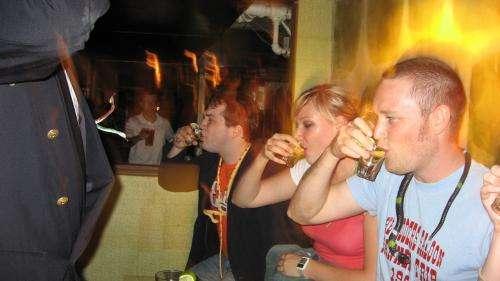Study finds risky drinking improves 'social status'

Young adults of both sexes are more likely to engage in riskier patterns of drinking alcohol as part of gaining a better social status among their peers—and health authorities need to consider these factors when developing prevention programs.
The research, conducted by Canadian institutions, looked at the patterns of same-sex natural drinking groups (NDGs) in a bar district of a medium-sized Ontario city.
After surveying participants, it was found men who engaged in frequent heavy episodic drinking and women who drank more frequently were given a higher status among their NDGs than those drinking less.
Men and women drinking more than their peers on their heaviest drinking night were also associated with achieving a better status.
Study author Dr Kathryn Graham, who has an affiliation with Curtin University's National Drug Research Institute (NDRI), says the role of group status among young adult drinkers is a new area of research.
"We expected these results for men but it's unclear whether we would find the same effect for women because there is more disapproval of heavy drinking by women," she says.
"It's unknown whether the same results would be found elsewhere but there is some qualitative research to suggest drinking larger amounts per occasion might be associated with status, at least in cultures where this behaviour is normative such as in the UK and Australia.
"We don't really know why a higher social status is associated with more drinking but, for young men especially, it may be related to the perception the ability to tolerate large amounts of alcohol is associated with 'coolness', power and masculinity.
"For young women, tolerance of alcohol is evaluated positively by female peers, often as a sign they can 'keep up with the boys'."
According to a 2009 NDRI study, Australians aged 14 to 24 are three to four times more likely to experience alcohol-related incidences of physical and verbal abuse, property damage or loss and fear-related situations.
The study also found young adult males make up 52 per cent of all drink drivers involved in serious road accidents.
Dr Graham says the findings from the Canadian example suggest there should be more emphasis on the concerns of young people and their status when considering prevention programming for alcohol use.
"Young adults' drinking may be positively reinforced because it helps them achieve or maintain positive social standing among friends, however, it is particularly concerning the riskiest forms of drinking, particularly for men, are associated with status," she says.
More information: Tara M. Dumas, Kathryn Graham, Sharon Bernards, Samantha Wells, "Drinking to reach the top: Young adults' drinking patterns as a predictor of status within natural drinking groups," Addictive Behaviors, Volume 39, Issue 10, October 2014, Pages 1510-1515, ISSN 0306-4603, dx.doi.org/10.1016/j.addbeh.2014.05.019.



















